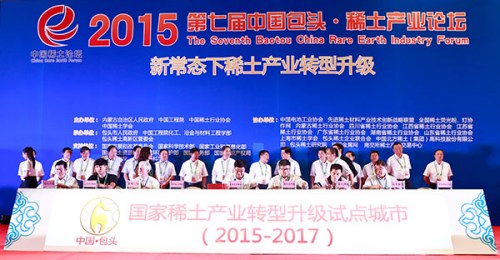
The 7th China Baotou Rare Earth Industry Forum was held in Baotou of the Inner Mongolia autonomous region on Saturday. The nation will continue to restructure the rare earth industry and give more support to high-tech companies in the downstream business. (Photo/China Daily)
About 90 percent of China's rare earth mining companies are incurring losses as rare earth prices continue to plummet due to overcapacity and illegal mining, industry officials said on Saturday.
Chen Zhanheng, deputy secretary-general of the Association of China Rare Earth Industry, said that most of the rare earth companies have been consistently losing money with many even facing the probability of unit closures this year.
"Some small smelters have stopped paying admission fees as the situation is becoming worse," he told China Daily on the sidelines of the 7th China Baotou Rare Earth Industry Forum held in Baotou of the Inner Mongolia autonomous region, which accounts for most of the country's output.
He said many companies rushed into rare earth mining and production business when the market was good, producing much more products than the market really needed, which coupled with illegal mining that has driven down the prices.
"Rare earths are not as difficult to mine and process as many seem to think, so many illegal miners are bypassing the regulations to dig and smelt the metals. This, in turn, led to a glut in the market," he said.
Industry data showed that production capacity of neodymium iron boron permanent magnets-made out of rare earths and used in a wide range of industrial applications ranging from smartphones to airplane equipment-was a mere 8,000 tons in 2000, but it has subsequently grown 50-fold in about 15 years.
The average prices for rare metals have been declining in China since 2011 and have continued to drop in recent months despite the government controls and crackdown on smuggling and black market trade.
Xu Tao, general engineer of China's largest rare earth miner REHT, said excess output has led to a sharp decline in the prices of rare earths this year, but they will return to normal as the government continues with its efforts to regulate the market.
"The market will play a leading role eventually, and with more companies trying to move from upstream to downstream and absorb extra capacity, the industry will turn around," she said.
From September to May, about 12,400 tons of rare earth was explored illegally, according to the Ministry of Industry and Information Technology, which shut down 55 illegal rare earth producers and 22 illegal mines in the past four years.
Xin Guobin, vice-minister of the ministry, said during the event that the government will continue to restructure the rare earth industry and give more support to high-tech companies in the downstream business.
As prices keep falling, exports of rare earth-related products from Inner Mongolia increased 36.5 percent year-on-year to 2,664 tons in the first six months, according to local customs.
About half of that went to the United States and about one-third to Japan, up 40 percent and 130 percent, respectively.
But Chen said exports to Japan would be lower than the figure provided by the customs, because China is not the only supplier of rare earths to Japan. Vietnam also exports a large amount of rare metals to the country.
China dropped a longstanding export quota on rare earths in January, and it abandoned its export tariffs on the minerals in April. These measures are expected to keep the prices low and boost overall exports, which are expected to hit 30,000 tons for the whole year, he said.
REHT and China Minmentals Rare Earth Co, two major rare earth extractors of the nation, reported sharp profit declines in their annual financial reports.
Operating revenue of REHT dropped 31.09 percent to 5.84 billion yuan ($949 million) in 2014 and its profits fell by 57.44 percent over the same period.
China Minmentals Rare Earth Co posted a 64.8 percent drop in operating revenue to 702 million yuan and its balance sheet turned from black to red with 55.8 million yuan of losses.
To restructure and consolidate its rare earth market, China integrated bigger companies with dozens of small miners around the end of 2014 and established six major rare earth groups.


















































